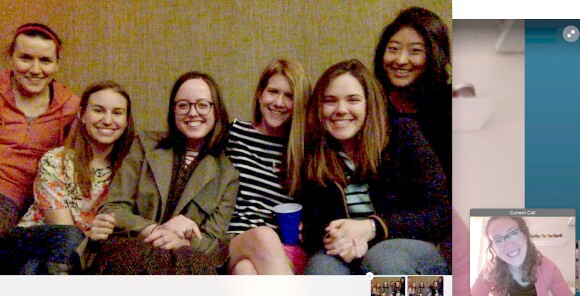The MediaVillage Articles Club -- March/April Selections

After a brief hiatus, Articles Club is back with content recommendations from our most recent meeting. There were two significant Articles Club additions this month. First, we welcomed our friend Sarah from Syracuse via Skype (pictured below). Second, we selected articles around a certain theme. As the eldest of the group, I was assigned to pick this theme -- no small task when you think of all the content worth exploring. I wanted to pick a subject that could mean something different to everyone. I mulled it over with great consternation and eventually selected memory. I gave my fellow club-mates all but 24 hours notice to pick their memory-related article. They did a great job as you will see below.
The MediaVillage Articles Club -- March/April Selections
Missed our selections from last month? Find them here.

My pick: A Mother’s Death, A Daughter’s Life: Remembering Natalie Wood
By Katherine Rosman, The New York Times
Why did you pick this article?
I have long been fascinated by the mysterious death of actress Natalie Wood. I gravitated towards this headline in The New York Times expecting insight into what played out the fateful night of Wood’s drowning in 1981. Such conspiracy played secondarily to a touching narrative about a daughter remembering the mother she only knew for eleven years -- mainly through the smell of her gardenia perfume. The piece was a story about sense memory (and a very effective ad for Wood’s daughter’s fragrance, named in honor of her mother, “Natalie”). In an increasingly virtual age where sight and sound are key, is scent still integral to our memories of people?
Chelsea’s pick: How I Learned to Stop Worrying and Love the Fake Nostalgia of Instagram
By David Yoon, Medium
Why did you pick this article?
“I'm really interested in the ways we preserve memories, especially in a time when all of our photos are stored on our phones and computers. My article presented one person's take on how Instagram taps into our craving for nostalgia with filters designed to make digital photos look like the sepia-toned or black and white images from our parents' and grandparents' photo albums. The author asserts that `old stuff just feels cooler.’ I think this is especially true for photographs that you can actually hold in your hands, rather than quickly scrolling through on your Instagram feed. I was excited to discuss with the group how they all store their favorite memories and how they think this might change in the next few years.”
Lyndsay’s pick: The Fiction of Memory: Elizabeth Loftus at TEDGlobal 2013
By Kate Torgovnick May, TEDBlog
Why did you pick this article?
“I found the topic of memory to be super interesting. I immediately thought of the first ten minutes of the popular podcast `Serial’ when host Sarah Koenig discussed the difficulty of recall and how it can influence a trial. I found both Koenig’s program and Torgovnick’s TEDBlog fascinating in how quickly people can change their minds from `unsure’ to `definite’ – and how much that can affect the future of someone else's life. I think we've all experienced false memories in some capacity so I think it's important to keep this type of study in mind so as to keep oneself grounded.”
Sarah’s pick: Early Childhood Poverty Damages Brain Development, Study Finds
Alice Bidwell, US News & World Report
Why did you pick this article?
“Working in high needs neighborhoods through non-profit programming, I am always fascinated by the implications of poverty. There are so many obvious indicators of poverty on human behavior and well-being: hunger, violence and crime, housing instability, drug use. Reading about how exposure to poverty early in a child’s development can have material impact on brain development -- creating significant obstructions to lifelong brain development -- was quite astonishing to me. The article showed how poverty can actually alter the physical makeup of a child's brain; that `those children exposed to poverty at an early age had smaller volumes of white and cortical gray matter.’ To me, this speaks to the incredible importance of prenatal care and early childhood programming/education. It also reinforces that educational policy cannot start at kindergarten (or even at evaluating high school completion).”
Yohanna’s pick: Anxiety and Working Memory Capacity: A Meta-Analysis and Narrative Review
By Tim P. Moran, Psychological Bulletin
Why did you pick this article?
“I wanted to learn more about how anxiety affects our ability to store and retrieve information from our memory system. I chose an article that reviewed previous studies that have examined the relationship between anxiety and working memory capacity. There is evidence that suggests that anxiety has the potential to drain our cognitive resources and negatively affect our daily performance and capacity for learning. This emphasizes the importance of recognizing symptoms of anxiety and seeking help such as psychotherapy. I wanted to share with the group that effective strategies to reduce anxiety can help combat cognitive vulnerabilities including attention biases, emotional regulation deficits and one’s overall ability to interpret environmental information.”
Image at top courtesy of Corbis. The opinions and points of view expressed in this commentary are exclusively the views of the author and do not necessarily represent the views of MediaVillage/MyersBizNet management or associated bloggers.


